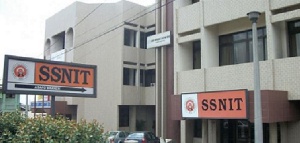Social Security and National Insurance Trust (SSNIT) is suffering from the knock-on effect of loans gone bad in the banking sector, due to its large shareholding in the sector.
With equity stake in more than 10 banks, listed and non-listed, SSNIT relies heavily on the sector for return on investment.
In the banking sector, a lot of these banks were caught up having to protesting against the Bulk Oil Distributors (BDCs) debt and so across board, almost every bank had to take quite a bit of a hit, and with the general slowing down of the economy, business has not been that good, SSNIT’s new Director General, Dr. John Ofori-Tenkorang, said.
Coming at a time when it has come under heavy criticism for investing poorly and paying pensioners poorly, the high Non-Performing Loans (NPLs) situation has reinforced the need for SNNIT to diversify its investments.
Dr. John Ofori-Tenkorang, however, thinks the Ghanaian economy offers enough options.
“Because we own a lot of banks, everybody comes and tells the same story. That is why it is important to diversify. If you had an economy where various asset classes were vibrant and liquid, then you could spread your eggs and not put them in one basket”, he said.
Dr. Ofori-Tenkorang said this when Ecobank, which SNNIT has a 16 percent stake in, presented its dividend for 2016, which was a little lower than that for 2015.
Several banks have made substantial provisions, which have led to a drop in profits, to cover for the debt owed by the Bulk Oil Distribution Companies and energy sector state owned entities, which is in excess of US$2.5billion.
Only five out of the more than 10 banks SSNIT has equity stake in, presented dividends for 2016; even so, most of them presented reduced figures or were flat.
The latest Banking Sector Stability Report indicates that NPLs have increased from Gh¢4.7billion to Gh¢6.4billion from February, 2016, to February, 2017, to 17.6 per cent.
Still, with the central bank’s Asset Quality Review, which took place in 2016, leading to a downgrade of some of the existing loans, NPLs are expected to breach the 20percent mark this quarter, as a result of the deterioration in asset quality.
Already reeling under falling contributions, following the introduction of the three-tier pension scheme in 2010, as well as lingering arrears from private and public contributors and rising operational cost.
The government, itself, is said to be in arrears to the tune of over Gh¢600million.
Finance Minister, Ken Ofori-Atta, recently expressed concern about the rising operational costs, demanding effective cost control and management measures to ensure the sustainability of the fund.
Business News of Saturday, 24 June 2017
Source: todaygh.com













